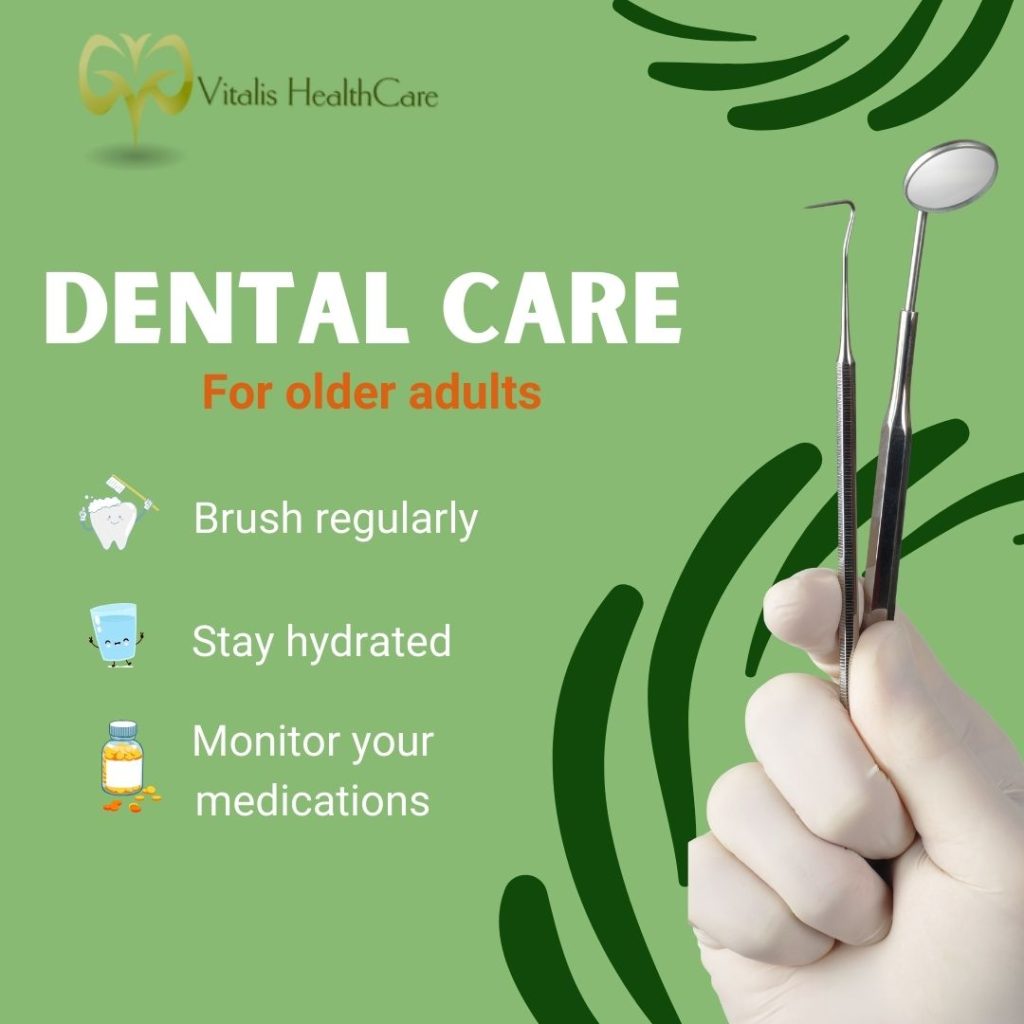Dental hygiene is a crucial part of our overall well-being, and as we age, this aspect of hygiene becomes increasingly important. Poor dental hygiene can lead to tooth decay, gum disease and even tooth loss. These conditions affect one’s ability to eat, speak and maintain proper nutrition. Additionally, oral infections have been linked to systemic diseases such as cardiovascular disease, bacteria pneumonia and even diabetes. Good oral hygiene is a key factor in healthy aging.
There are some common oral health challenges faced by older adults. These challenges may be caused by a variety of reasons, and could be prevented and combated with good oral hygiene. Some of theses challenges include;
- Xerostomia: This is popularly known as dry mouth. It is a condition more common in seniors, often as a side effect of medications. Saliva helps to wash away food particles and neutralize acids in the mouth, hence reduced saliva production can increase the risk of caviti
- Gum Disease: Gum disease, or periodontal disease, is an infection and inflammation of the tissues that support the teeth. It is a common problem among older adults, and can lead to inflamed gums, bone loss, and tooth loss if left untreated.
- Tooth Sensitivity: As we age, the enamel(a hard glossy substance that covers the crown of a tooth) on our teeth wears down, making them more sensitive to hot and cold foods or drinks.
Due to the dental challenges listed above, it is important that older adults adopt healthy dental hygiene practices in their daily lifestyle. Some essential tips for maintaining oral health in older adults include:
- Brush and Floss Regularly: Brushing twice a day with fluoride toothpaste is essential for preventing plaque buildup and cavities. Seniors who struggle with manual dexterity(the ability to use one’s hands in a coordinated manner) might benefit from electric toothbrushes, which make brushing more effective and less tiring. Flossing daily is also crucial, as it removes food particles and plaque between teeth where a toothbrush can’t reach.
- Use Fluoride Mouthwash: In addition to brushing and flossing, using a fluoride mouthwash can help protect against cavities. This is especially important for seniors who may be at higher risk for tooth decay due to dry mouth or weakened enamel.
- Stay Hydrated: Combat dry mouth by staying hydrated throughout the day. Seniors should drink plenty of water and avoid sugary or acidic drinks that can increase dryness and damage tooth enamel. Chewing sugar-free gum or sucking on sugarless candies can also stimulate saliva production.
- Visit the Dentist Regularly: Routine dental check-ups are vital for early detection of potential issues like gum disease, tooth decay, or oral cancer. Dentists can also help seniors with denture adjustments and address any other specific oral health concerns. Even if you wear dentures, regular dental visits are important to monitor your overall oral health.
- Monitor Medications: Some medications can negatively impact oral health, particularly those that cause dry mouth. If dry mouth is a problem, talk to your doctor about adjusting your medication or explore treatments like artificial saliva products to alleviate symptoms.
- Proper Denture Care: If you wear dentures, ensure they are cleaned daily. Remove them at night to give your gums a break, and soak them in a denture cleaner. Regularly inspect your dentures for signs of wear or fit issues, and consult your dentist if you experience discomfort or slipping.
Maintaining oral hygiene is essential not only for preserving teeth and gums but also for overall health. Poor dental hygiene can lead to infections that affect the heart, lungs, and other vital systems. For seniors, maintaining a healthy mouth can also enhance self-esteem and improve social interactions, making it an integral part of aging gracefully.
At Vitalis Healthcare, the safety and well-being of our patients is a top priority. Our team of registered nurses and experienced caregivers guarantee to contribute to the achievement of our mission, to improve the quality of life for our clients in the comfort of their homes.
To learn more about our services and how best we can help you, kindly book a free consultation to get in touch with our client care coordinator.
Phone Number: 240.716.6874
Email: info@vitalishealthcare.com
Location: We provide our services in every county in the State of Maryland, United States of America.
Office Address: 8757 Georgia Avenue Suite 440 Silver Spring, MD 20910


